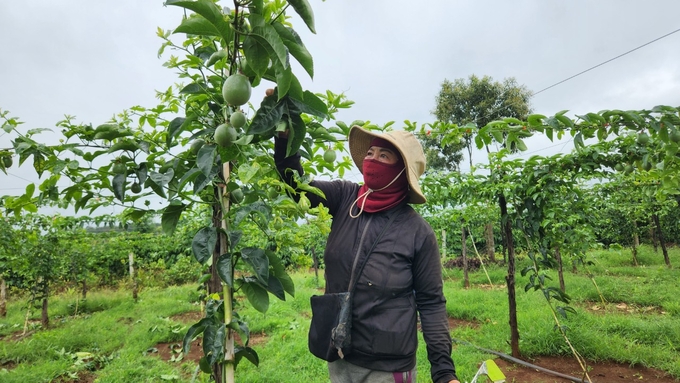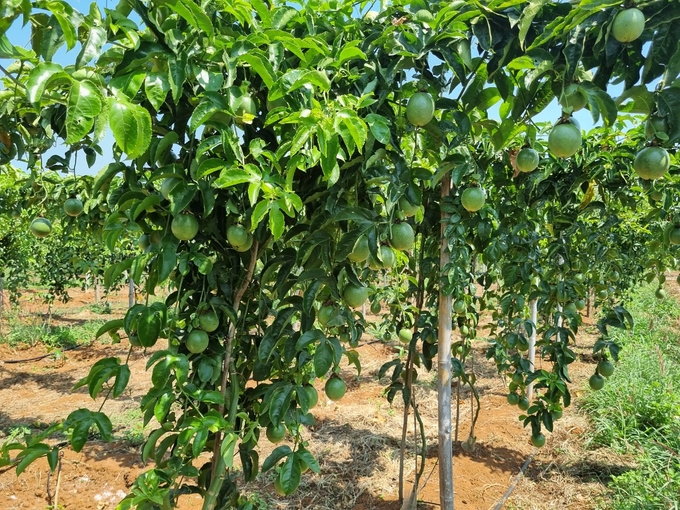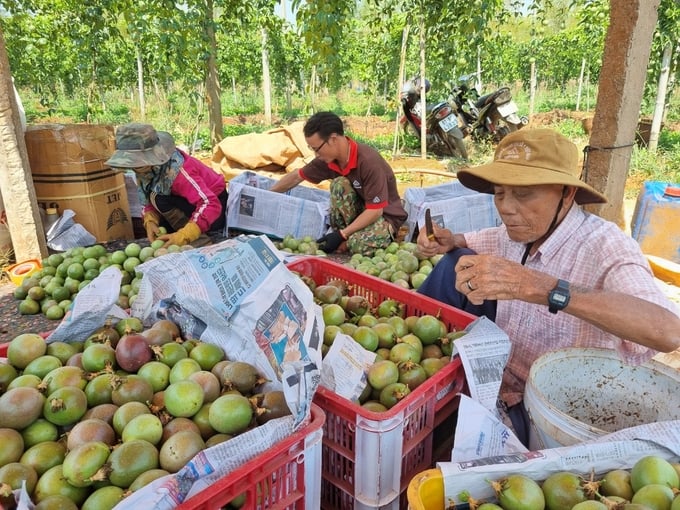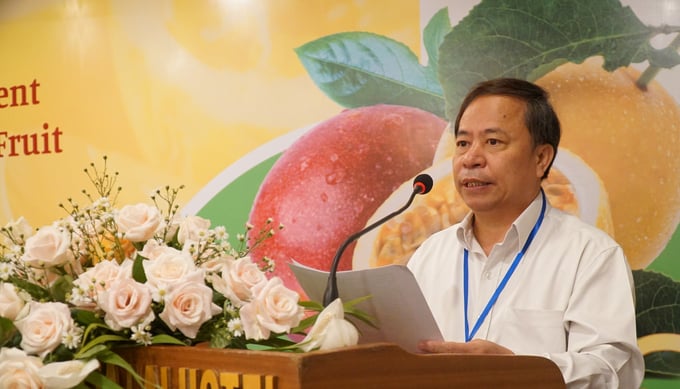June 20, 2025 | 02:46 GMT +7
June 20, 2025 | 02:46 GMT +7
Hotline: 0913.378.918
June 20, 2025 | 02:46 GMT +7
Hotline: 0913.378.918

The conference attracted 50 delegates who were scientists from Asia - Pacific. Photo: Tuan Anh.
The Vietnam Academy of Agricultural Science (VAAS) and the Food and Fertilizer Technology - Asia Pacific Network of Science and Technology Centres (FFT-ASPAC) organized an international workshop on July 2. The workshop focused on improving quality management for the passion fruit value chain in the Asia-Pacific region.
Passion fruit is native to South America but has gained popularity as a tropical and sub-tropical fruit in Asia. Due to its remarkable taste and high nutritional content, the global demand for passion fruit has surged for both fresh and processed products.
Nevertheless, to fully use the potential of passion fruit, it is crucial to improve the management of quality at every stage of the value chain. The primary limiting factor that affects passion fruit output is the management of plant quality and insect control.
Dr. Nguyen Thi Bich Ngoc, Vice Dean of the Plant Protection Research Institute (VAAS), stated that certain regions, specifically Gia Lai, Nghe An, and Dak Lak, have prioritized the identification and selection of primary passion fruit gardens. The Department of Agriculture and Rural Development in Gia Lai has acknowledged 14 top-tier passion fruit gardens and established a three-tiered passion fruit production system in state-of-the-art net houses. These gardens are free from diseases and can produce millions of plant seedlings each year.

Disease management in passion fruit is considered a key factor for this crop to develop sustainably. Photo: Tuan Anh.
However, virus illnesses continue to be the primary factor impacting the sustainable production of passion fruit. In Vietnam, the Passionfruit Woodiness Virus (PWV) has particularly inflicted significant harm on passion fruit cultivation.
Dr. Ngoc emphasized the importance of utilizing plant seedlings cultivated in a three-level net house to effectively control virus infections. Annually, the mother plant must undergo viral testing. During the cultivation process, it is crucial to remove weeds and plant residues, as well as uproot plants that serve as hosts for viruses and vectors for diseases, such as passion fruit, gourds, cucumbers, bitter melons, chayote, eggplants, peppers, etc., from the designated area for growing passion fruit. Prior to planting, apply pesticides to control termites, nematodes, and soil pests.
According to Dr. Rozieta Binti Laboh, a researcher from the Malaysian Agricultural Research and Development Institute, the output of passion fruit in Malaysia has recently experienced a decline. Disease infection is a primary factor contributing to the decrease in passion fruit production. The two primary illnesses that impact passion fruit in Malaysia are passion fruit mosaic virus and wilt disease caused by Fusarium fungi. Furthermore, the proliferation of fruit flies in passion fruit is also a significant issue.

Passion fruit is growing strongly in Vietnam and Asian countries. Photo: Tuan Anh.
The majority of passion fruit farms in Malaysia are afflicted with viral infections, resulting in a substantial decrease in crop output and hindering the possibility of large-scale commercial production.
According to Dr. Ogata Tatsushi, a senior researcher at the Japan International Research Center for Agricultural Sciences (JIRCAS), passion fruit growers face a significant challenge mostly caused by viruses and illnesses that are transmitted through grafting. Thus, in order to acquire robust and virus-free passion fruit cultivars, it is imperative to carry out apex grafting in a sterile environment. This process entails removing the topmost part and conducting in vitro micrografting to stimulate the growth of shoots that are free from viruses.
In vitro micrografting offers the benefit of not need specialized equipment. Although the method is very straightforward, the grafted seedlings exhibit rapid growth following grafting.
The passion fruit plant was initially introduced to Thailand in 1995 and has subsequently undergone substantial growth. According to Dr. Jenjira Choonpukam from the Faculty of Agriculture at Kasetsart University in Thailand, the Thai Ministry of Agriculture implemented the Good Agricultural Practices (GAP) guidelines for passion fruit production in 1998 with the aim of promoting commercial production. Following that, the Royal Project Foundation in Thailand initiated the promotion of passion fruit as a profitable agricultural product for farmers in designated project regions.
Thailand prioritizes the cultivation of high-quality passion fruit by focusing on the development and cultivation of superior seedlings. Thailand not only emphasizes the cultivation of superior imported species, but also places significant emphasis on multiplication. Seeds are used to cultivate rootstock for growing healthy kinds of passion fruit. Once the rootstock reaches an age of 2-3 months, healthy scion branches are grafted onto it.

Improving the quality of passion fruit is a goal that should be a top priority. Photo: Tuan Anh.
Vietnamese passion fruit has experienced a surge in export potential in recent years, mostly driven by the strong demand from overseas markets for fresh fruit and ready-to-drink products. Currently, 80% of the passion fruit production is allocated for international markets, and the export value has been consistently growing, indicating a stable trend.
Vietnam has the ability to grow passion fruit throughout the year, which sets it apart from other major passion fruit-producing countries globally. The Central Highlands is the primary hub for commercial passion fruit production, responsible for more than 90% of the country's cultivation of this fruit.
Nevertheless, Vietnam's passion fruit industry encounters numerous obstacles stemming from diseases and constraints in cultivation practices. Furthermore, the challenges are exacerbated by market volatility resulting from an oversupply relative to demand and a significant dependence on exports.
Dr. Nguyen Van Viet, affiliated with the Nafoods Research and Development Institute (a division of Nafoods Group), emphasized that Nafoods Group has prioritized the investigation and cultivation of passion fruit varieties that are free from viruses and can be easily traced, in order to effectively control quality and improve the value chain. In addition, Nafoods Group imparts technological knowledge to farmers on cultivation practices, pest control, harvesting, and post-harvest preservation in order to promote sustainable development.

Prof. Dr. Nguyen Hong Son, Director of the Vietnam Academy of Agricultural Sciences chaired the workshop. Photo: Tuan Anh.
"Despite its small size, the Vietnamese passion fruit industry exhibits significant potential for rapid expansion. It is needed to promptly address urgent issues, such as the development of new resistant varieties using advanced production technology, as well as the implementation of effective and sustainable pest management strategies", Dr. Viet emphasized.
Prof. Dr. Nguyen Hong Son, Director of the Vietnam Academy of Agricultural Sciences, explained that passion fruit agriculture in Vietnam experiences constant fluctuations in area due to market influences and diseases. During its peak period from 2017 to 2020, the cultivation area of passion fruit in Vietnam reached 8,000 hectares, and there are intentions to further grow it to 12,000 hectares by 2025. Nevertheless, the region is seeing a decrease in size and is even displaying a pattern of decline as a result of disease influences and market conditions. Thus, improving quality management throughout the value chain is seen as a crucial element.
Translated by Linh Linh

(VAN) The waste of resources from agricultural by-products and the situation of counterfeit and poor quality goods in production causing losses of thousands of billions were pointed out by the National Assembly deputy.

(VAN) After 5 years of implementation, the CAI initiative has helped coffee growers change their farming practices, moving toward responsible agriculture that meets global export standards.

(VAN) The primary prerequisite for the comprehensive and robust integration of Vietnam's livestock sector into the global value chain is the establishment of a disease control system.

(VAN) The results of national programs are essential for establishing a contemporary livestock sector that is well-equipped to meet the demands of both domestic and international markets, with robust biosafety standards.

(VAN) The UNESCO Global Geopark revalidation of Non nuoc Cao Bang and the transition to a two-tier administrative model are presently undergoing a pivotal moment in Cao Bang, the northernmost province of Vietnam.
/2025/06/13/5330-2-004539_953.jpg)
(VAN) Changing policy mindset and removing investment barriers are urgent requirements to open up new development space for enterprises in the agricultural sector.

(VAN) The areas include the restoration of five million hectares of marine ecosystems.